- Home
- Bertolt Brecht
Bertolt Brecht: Mutter Courage und ihre Kinder 7 Page 24
Bertolt Brecht: Mutter Courage und ihre Kinder 7 Read online
Page 24
Why don’t our sons bleed any longer, why don’t our daughters weep any more?
Why do only the calves in the slaughterhouse have any blood, why only willows on Lake Urmi tears?
The Grand King must have a new province, the peasant must relinquish his savings.
In order to capture the roof of the world, the cottage roofs have to be torn down.
Our men are scattered in all directions, so that the great ones can eat at home.
The soldiers kill each other, the marshals salute each other.
The widow’s tax money has to be fingered to see if it’s good, the swords break.
The battle has been lost, but the helmets have been paid for.
Is that right? Is that right?
SHAUVA: Yes, yes, yes, yes, yes, that’s right.
AZDAK: Do you want to hear the whole thing?
The first Ironshirt nods.
THE SECOND IRONSHIRT to Shauva: Did he teach you that song?
SHAUVA: Yes. Only my voice isn’t good.
THE SECOND IRONSHIRT: No. To Azdak: Go on singing.
AZDAK: The second verse is about the peace. He sings:
The offices are jammed, the officials are working in the streets.
The rivers overflow their banks and lay waste the fields.
Those incapable of letting down their own trousers rule countries.
Those who can’t count up to four devour eight courses.
The corn farmers look round for buyers, but see only the starving.
The weavers go home from their looms in rags.
Is that right? Is that right?
SHAUVA: Yes, yes, yes, yes, yes, that’s right.
AZDAK:
That’s why our sons bleed no longer, our daughters weep no more.
That’s why only the calves in the slaughterhouse have any blood.
And the willows in the morning on Lake Urmi have any tears.
THE FIRST IRONSHIRT after a pause: Are you going to sing that song here in town?
AZDAK: Of course. What’s wrong with it?
THE FIRST IRONSHIRT: Do you see the sky getting red? Turning round, Azdak sees the sky reddened by fire. That’s in the outer town. This morning when Prince Kazbeki had Governor Abashvili beheaded our carpet weavers also caught the ‘Persian disease’. They asked if Prince Kazbeki isn’t eating too many courses. And this afternoon they strung up the town judge. But we beat them to pulp for two piastres per weaver, you understand?
AZDAK after a pause: I understand.
He glances shyly round and, creeping away, sits down in a corner, his head in his hands.
THE FIRST IRONSHIRT to the third, after they have all had a drink: Just wait and see what’ll happen next.
The first and second Ironshirts walk towards Azdak and block his exit.
SHAUVA: I don’t think he’s a really bad character, gentlemen. He poaches a few chickens here and there, and perhaps an odd rabbit.
THE SECOND IRONSHIRT approaching Azdak: You’ve come here to fish in troubled waters, eh?
AZDAK looking up: I don’t know why I’ve come here.
THE SECOND IRONSHIRT: Do you happen to be in with the carpet weavers? Azdak shakes his head. And what about this song?
AZDAK: From my grandfather. A stupid, ignorant man.
THE SECOND IRONSHIRT: Right. And what about the dyer who paid the wages?
AZDAK: That was in Persia.
THE FIRST IRONSHIRT: And what about denouncing yourself for not having hanged the Grand Duke with your own hands?
AZDAK: Didn’t I tell you that I let him escape?
SHAUVA: I swear to it. He let him escape.
The Ironshirts drag Azdak screaming to the gallows. Then they let him loose and burst out laughing. Azdak joins in the laughter, laughing loudest. They then unchain him. They all start drinking. Enter the fat prince with a young man.
THE FIRST IRONSHIRT to Azdak: There you have your new age.
More laughter.
THE FAT PRINCE: And what is there to laugh about here, my friends? Permit me a serious word. Yesterday morning the Princes of Grusinia overthrew the Grand Duke’s warthirsty government and did away with his governors. Unfortunately the Grand Duke himself escaped. In this fateful hour our carpet weavers, these eternal troublemakers, had the audacity to incite a rebellion and hang our universally beloved city Judge, our dear Illa Orbeliani. Tut-tut. My friends, we need peace, peace, peace in Grusinia. And justice. Here I bring you my dear nephew, Bizergan Kazbeki. He’s to be the new Judge, a talented fellow. I say: the people must decide.
THE FIRST IRONSHIRT: Does this mean we elect the Judge?
THE FAT PRINCE: Precisely. The people propose a talented fellow. Confer, my friends. The Ironshirts confer. Don’t worry, little fox. The job’s yours. And once we’ve run the Grand Duke to earth we won’t have to kiss the rabble’s arse any more.
THE IRONSHIRTS to each other: They’ve got the jitters because they still haven’t caught the Grand Duke.—We’ve this clerk to thank for that. He let him get away.—They’re not sure of things yet. So they say: ‘My friends!’ And: ‘The people must decide!’—Now he even wants justice for Grusinia!—But fun’s fun as long as it lasts.—We’ll ask the clerk; he knows all about justice. Hey, scoundrel...
AZDAK: You mean me?
THE FIRST IRONSHIRT continues: Would you like to have the nephew as Judge?
AZDAK: You asking me? You’re not really asking me that, are you?
THE SECOND IRONSHIRT: Why not? Anything for a laugh!
AZDAK: I take it you want him put to the test? Am I right? Have you a crook on hand? An experienced one? So the candidate can show how good he is?
THE THIRD IRONSHIRT: Let me see. We have the Governor’s tarts’ two doctors down there. Let’s use them.
AZDAK: Stop! That’s no good! You can’t take real crooks till we’re sure of the Judge being appointed. He may be an ass, but he must be appointed or else the law is violated. The law is a very sensitive organ. Like the spleen. Once attacked with fists, death occurs. You can hang those two. Why not? You won’t have violated the law, because no Judge was present. Judgment must always be passed with complete solemnity—because it’s such rot. Suppose a Judge throws a woman into clink for having stolen a corncake for her child. And he isn’t wearing his robes. Or he’s scratching himself while passing sentence so that more than a third of his body is exposed—in which case he’d have to scratch his thigh—then the sentence he passes is a disgrace and the law is violated. It would be easier for a Judge’s robe and a Judge’s hat to pass sentence than for a man without all that paraphernalia. If you don’t look out, the law goes up in smoke. You don’t taste wine by offering it to a dog. Why not? Because the wine would be gone.
THE FIRST IRONSHIRT: So what do you suggest, you hair-splitter?
AZDAK: I’ll be the defendant. I even know what sort. Azdak whispers to them.
THE FIRST IRONSHIRT: You? All burst out laughing.
THE FAT PRINCE: What have you decided?
THE FIRST IRONSHIRT: We’ve decided to have a rehearsal. Our good friend will act as defendant, and here’s the Judge’s seat for the candidate.
THE FAT PRINCE: That’s unusual. But why not? To the nephew: A mere formality, little fox. What did they teach you? Who gets there first? The slow runner or the fast one?
THE NEPHEW: The silent one, Uncle Arsen.
The nephew sits in the Judge’s seat, the fat prince standing behind him. The Ironshirts sit on the steps. Enter Azdak, imitating the unmistakeable gait of the Grand Duke.
AZDAK: Is there anyone here who knows me? I am the Grand Duke.
THE FAT PRINCE: What is he?
THE SECOND IRONSHIRT: The Grand Duke. He really does know him.
THE FAT PRINCE: Good.
THE FIRST IRONSHIRT: Get on with the proceedings.
AZDAK: Listen! I’m accused of war-mongering. Ridiculous! Am saying: ridiculous! Is that enough? If not, have brought lawyers along. About 500. He points b
ehind him, pretending to be surrounded by lawyers. Requisition all available seats for lawyers. The Ironshirts laugh; the fat prince joins in.
THE NEPHEW to the Ironshirts: Do you want me to try this case? I must admit I find it rather unusual. From the point of view of taste, I mean.
THE FIRST IRONSHIRT: Go on.
THE FAT PRINCE smiling: Let him have it, little fox!
THE NEPHEW: All right. People of Grusinia versus Grand Duke. What have you to say, defendant?
AZDAK: Any amount. Of course, have myself read war lost. Started war at the time on advice of patriots like Uncle Kazbeki. Demand Uncle Kazbeki as witness. The Ironshirts laugh.
THE FAT PRINCE to the Ironshirts, affably: Queer fish, eh?
THE NEPHEW: Motion overruled. You’re being accused not of declaring war, which every ruler has to do once in a while, but of conducting it badly.
AZDAK: Rot! Didn’t conduct it at all! Had it conducted. Had it conducted by Princes. Made a mess of it, of course.
THE NEPHEW: Do you deny having been Commander in Chief?
AZDAK: Not at all. Always was Commander in Chief. Even at birth howled at wet-nurse; trained to drop turds in latrine. Got used to command. Always commanded officials to rob my cash-box. Officers flog soldiers only on my command. Landlords sleep with peasants’ wives only when strictly commanded by me. Uncle Kazbeki here grew stomach only on my command.
THE IRONSHIRTS clapping: He’s good! Up the Grand Duke!
THE FAT PRINCE: Answer him, little fox! I’m with you!
THE NEPHEW: I shall answer him according to the dignity of the law. Defendant, preserve the dignity of the law.
AZDAK: Agreed. Command you proceed with the trial.
THE NEPHEW: It’s not your business to command me. So you claim the Princes forced you to declare war. Then how can you claim they made a mess of it?
AZDAK: Didn’t send enough troops. Embezzled funds. Brought sick horses. During attack found drunk in whorehouse. Propose Uncle Kaz as witness. The Ironshirts laugh.
THE NEPHEW: Are you making the outrageous claim that the Princes of this country did not fight?
AZDAK: No. Princes fought. Fought for war contracts.
THE FAT PRINCE jumping up: That’s too much! This man talks like a carpet weaver!
AZDAK: Really? Only telling the truth!
THE FAT PRINCE: Hang him! Hang him!
THE FIRST IRONSHIRT: Keep quiet. Get on, Excellency.
THE NEPHEW: Quiet! Now pass sentence. Must be hanged. Hanged by the neck. Having lost war. Sentence passed. No appeal.
THE FAT PRINCE hysterically: Away with him! Away with him! Away with him!
AZDAK: Young man, seriously advise not to fall publicly into jerky, clipped manner of speech. Can’t be employed as watchdog if howl like wolf. Got it?
THE FAT PRINCE: Hang him!
AZDAK: If people realize Princes talk same language as Grand Dukes, may even hang Grand Dukes and Princes. By the way, sentence quashed. Reason: war lost, but not for Princes. Princes have won their war. Got themselves paid 3,863,000 piastres for horses not delivered.
THE FAT PRINCE: Hang him!
AZDAK: 8,240,000 piastres for food supplies not produced.
THE FAT PRINCE: Hang him!
AZDAK: Are therefore victors. War lost only for Grusinia, which is not present in this Court.
THE FAT PRINCE: I think that’s enough, my friends. To Azdak: You can withdraw, gaol-bird. To the Ironshirts: I think you can now ratify the new Judge’s appointment, my friends.
THE FIRST IRONSHIRT: Yes, we can do that. Take down the Judge’s robe. One of the Ironshirts climbs on the back of another and pulls the robe off the hanged man. And now—to the nephew— you be off so that we can put the right arse on the right seat. To Azdak: Step forward, you, and sit on the Judge’s seat. Azdak hesitates. Sit down up there, man. Azdak is thrust on to the seat by the Ironshirts. The Judge was always a rascal. Now the rascal shall be the Judge. The Judge’s robe is placed round his shoulders, the wicker from a bottle on his head. Look! There’s a Judge for you!
THE SINGER
Now there was civil war in the land. The rulers were unsafe.
Now Azdak was made a Judge by the Ironshirts.
Now Azdak remained a Judge for two years.
THE SINGER WITH HIS MUSICIANS
Great houses turn to ashes
And blood runs down the street.
Rats come out of the sewers
And maggots out of the meat.
The thug and the blasphemer
Lounge by the altar-stone:
Now, now, now Azdak
Sits on the Judgment throne.
Azdak sits on the Judge’s seat peeling an apple. Shauva sweeps out the hall. On one side an invalid in a wheelchair, the accused doctor and a man in rags with a limp; opposite, a young man accused of blackmail. An Ironshirt stands on guard holding the Ironshirts’ banner.
AZDAK: In view of the large number of cases, the Court today will hear two cases simultaneously. Before I open the proceedings, a short announcement: I receive—he stretches out his hand; only the blackmailer produces some money and hands it to him—I reserve for myself the right to punish one of these parties here—he glances at the invalid—for contempt of court. You—to the doctor—are a doctor, and you—to the invalid— are bringing a complaint against him. Is the doctor responsible for your condition?
THE INVALID: Yes. I had a stroke because of him.
AZDAK: That sounds like professional negligence.
THE INVALID: More than negligence. I gave this man money to study. So far he hasn’t paid me back one penny. And when I heard he was treating a patient free, I had a stroke.
AZDAK: Rightly. To the limping man. And you, what do you want here?
THE LIMPING MAN: I’m the patient, your Worship.
AZDAK: He treated your leg?
THE LIMPING MAN: Not the right one. My rheumatism was in the left leg, and he operated on my right. That’s why I’m limping now.
AZDAK: And you got that free?
THE INVALID: A 500-piastre operation free! For nothing! For a God-Bless-You! And I paid this man’s studies! To the doctor: Did you learn to operate for nothing at school?
THE DOCTOR to Azdak: Your Worship, it is actually the custom to demand the fee before the operation, as the patient is more willing to pay before an operation than after. Which is only human. In this case I was convinced, when I started the operation, that my servant had already received the fee. In this I was mistaken.
THE INVALID: He was mistaken! A good doctor doesn’t make mistakes. He examines before he operates.
AZDAK: That’s right. To Shauva: Public Prosecutor, what’s the other case about?
SHAUVA busily sweeping: Blackmail.
THE BLACKMAILER: High Court of Justice, I’m innocent. I only wanted to find out from the landowner in question if he really had raped his niece. He kindly informed me that this was not the case, and gave me the money only so that I could let my uncle study music.
AZDAK: Ah ha! To the doctor: You on the other hand can’t produce any extenuating circumstances in your defence?
THE DOCTOR: Except that to err is human.
AZDAK: And you know that in money matters a good doctor is conscious of his responsibility? I once heard of a doctor who made a thousand piastres out of one sprained finger: he discovered it had something to do with the circulation of the blood, which a less good doctor would have overlooked. On another occasion, by careful treatment, he turned a mediocre gall bladder into a gold mine. You have no excuse, Doctor. The corn merchant Uxu made his son study medicine to get some knowledge of trade—our medical schools are that good. To the blackmailer: What’s the name of the landowner?
SHAUVA: He doesn’t want it to be known.
AZDAK: In that case I will pass judgment. The Court considers the blackmail proved. And you—to the invalid— are sentenced to a fine of 1000 piastres. If you get a second stroke the doctor will have to treat you free and
if necessary amputate. To the limping man: As compensation, you will receive a bottle of embrocation. To the blackmailer: You are sentenced to hand over half the proceeds of your deal to the Public Prosecutor, to keep the landowner’s name secret. You are advised, moreover, to study medicine. You seem well suited to that profession. And you, Doctor, are acquitted because of an inexcusable professional mistake. The next cases!
THE SINGER WITH HIS MUSICIANS
Beware of willing Judges
For Truth is a black cat
In a windowless room at midnight
And Justice a blind bat.
A third and shrugging party
Alone can right our wrong.
This, this, this, Azdak
Does for a mere song.
Enter Azdak from the caravansary on the highway, followed by the old, bearded innkeeper. The Judge’s seat is carried by a manservant and Shauva. An Ironshirt with a banner takes up position.
AZDAK: Put it here. Then at least we can get some air and a little breeze from the lemon grove over there. It’s good for Justice to do it in the open. The wind blows her skirts up and you can see what’s underneath. Shauva, we have eaten too much. These rounds of inspection are very exhausting. To the innkeeper: So it’s about your daughter-in-law?
THE INNKEEPER: Your Worship, it’s about the family honour. I wish to bring an action on behalf of my son, who’s gone on business across the mountain. This is the offending stableman, and here’s my unfortunate daughter-in-law.
Enter the daughter-in-law, a voluptuous wench. She is veiled.
AZDAK sitting down: I receive. Sighing, the innkeeper hands him some money. Good. Now the formalities are disposed of. This is a case of rape?
THE INNKEEPER: Your Worship, I surprised this rascal in the stable in the act of laying our Ludovica in the straw.
AZDAK: Quite right, the stable. Beautiful horses. I particularly like the little roan.
THE INNKEEPER: The first thing I did of course was to berate Ludovica on behalf of my son.
AZDAK seriously: I said I liked the little roan.
THE INNKEEPER coldly: Really?—Ludovica admitted that the stableman took her against her will.
AZDAK: Take off your veil, Ludovica. She does so. Ludovica, you please the Court. Tell us how it happened.

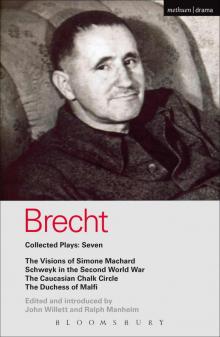 Bertolt Brecht: Mutter Courage und ihre Kinder 7
Bertolt Brecht: Mutter Courage und ihre Kinder 7 Bertolt Brecht
Bertolt Brecht Bertolt Brecht: Mutter Courage und ihre Kinder 6
Bertolt Brecht: Mutter Courage und ihre Kinder 6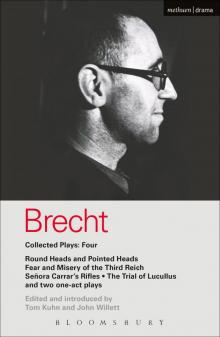 Bertolt Brecht: Mutter Courage und ihre Kinder 4
Bertolt Brecht: Mutter Courage und ihre Kinder 4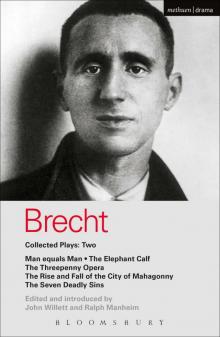 Bertolt Brecht: Mutter Courage und ihre Kinder 2
Bertolt Brecht: Mutter Courage und ihre Kinder 2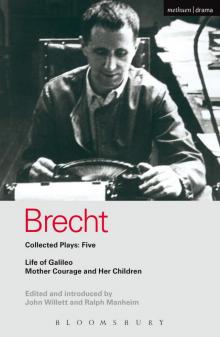 Bertolt Brecht: Mutter Courage und ihre Kinder 5
Bertolt Brecht: Mutter Courage und ihre Kinder 5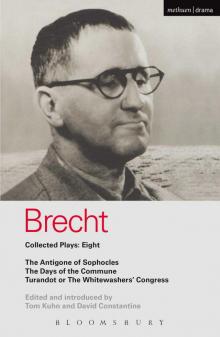 Collected Plays, Volume 4 (Bertolt Brecht: Plays, Poetry & Prose) 8
Collected Plays, Volume 4 (Bertolt Brecht: Plays, Poetry & Prose) 8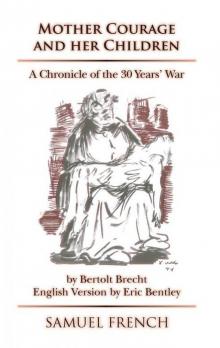 Mother Courage and Her Children
Mother Courage and Her Children Bertolt Brecht: Mutter Courage und ihre Kinder 1
Bertolt Brecht: Mutter Courage und ihre Kinder 1 Brecht Collected Plays: 3: Lindbergh's Flight; The Baden-Baden Lesson on Consent; He Said Yes/He Said No; The Decision; The Mother; The Exception & the ... St Joan of the Stockyards (World Classics)
Brecht Collected Plays: 3: Lindbergh's Flight; The Baden-Baden Lesson on Consent; He Said Yes/He Said No; The Decision; The Mother; The Exception & the ... St Joan of the Stockyards (World Classics)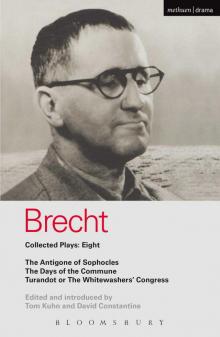 Brecht Plays 8: The Antigone of Sophocles; The Days of the Commune; Turandot or the Whitewasher's Congress: The Antigone of Sophocles , The Days of the Comm (World Classics)
Brecht Plays 8: The Antigone of Sophocles; The Days of the Commune; Turandot or the Whitewasher's Congress: The Antigone of Sophocles , The Days of the Comm (World Classics) Brecht Collected Plays: 1: Baal; Drums in the Night; In the Jungle of Cities; Life of Edward II of England; & 5 One Act Plays: Baal , Drums in the Night , In the Jungle of Ci (World Classics)
Brecht Collected Plays: 1: Baal; Drums in the Night; In the Jungle of Cities; Life of Edward II of England; & 5 One Act Plays: Baal , Drums in the Night , In the Jungle of Ci (World Classics)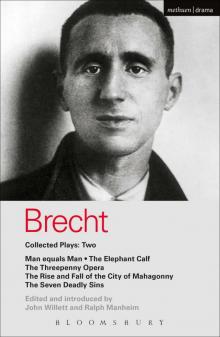 Brecht Collected Plays: 2: Man Equals Man; Elephant Calf; Threepenny Opera; Mahagonny; Seven Deadly Sins: Man Equals Man , Elephant Calf , Threepenny Ope (World Classics)
Brecht Collected Plays: 2: Man Equals Man; Elephant Calf; Threepenny Opera; Mahagonny; Seven Deadly Sins: Man Equals Man , Elephant Calf , Threepenny Ope (World Classics)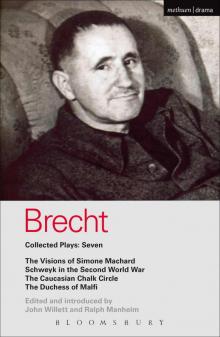 Brecht Collected Plays: 7: Visions of Simone Machard; Schweyk in the Second World War; Caucasian Chalk Circle; Duchess of Malfi (World Classics)
Brecht Collected Plays: 7: Visions of Simone Machard; Schweyk in the Second World War; Caucasian Chalk Circle; Duchess of Malfi (World Classics)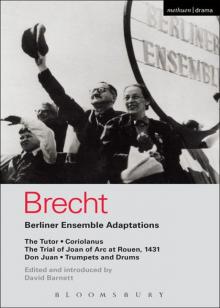 Berliner Ensemble Adaptations
Berliner Ensemble Adaptations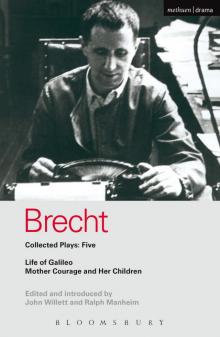 Brecht Collected Plays: 5: Life of Galileo; Mother Courage and Her Children (World Classics)
Brecht Collected Plays: 5: Life of Galileo; Mother Courage and Her Children (World Classics) Brecht Collected Plays: 6: Good Person of Szechwan; The Resistible Rise of Arturo Ui; Mr Puntila and his Man Matti (World Classics)
Brecht Collected Plays: 6: Good Person of Szechwan; The Resistible Rise of Arturo Ui; Mr Puntila and his Man Matti (World Classics)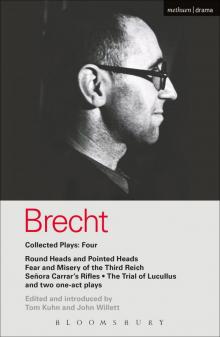 Brecht Collected Plays: 4: Round Heads & Pointed Heads; Fear & Misery of the Third Reich; Senora Carrar's Rifles; Trial of Lucullus; Dansen; How Much Is ... and Misery , Carr (World Classics)
Brecht Collected Plays: 4: Round Heads & Pointed Heads; Fear & Misery of the Third Reich; Senora Carrar's Rifles; Trial of Lucullus; Dansen; How Much Is ... and Misery , Carr (World Classics)